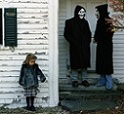|
Inception (2010) is probably the most recent big-budget blockbuster to inspire mass confusion amongst it audience. The key to understanding it, and particularly its somewhat frustrating ending, is to consider Inception to be a movie about movies. Inception ending Let me backtrack a bit. Obviously, in talking about the ending of the movie, Iím going to spoil things. Inception is of course not ďliterallyĒ about movies. No character talks about movies during the filmís running time. Taken at face value, itís just a thriller about dreams, and people who can go inside them. Each of these people has a totem, a small object which only they know the specific properties of, which cannot be replicated in a dream (thereby allowing its possessor to discover whether the space they are in is real or not). Cobb (Leonardo DiCaprio) chooses a little spinning top to be his totem - the idea therefore being that if the top falls down after being spun, he is in the real world, but still in the dream world if it continues to spin. Following this, the last shot of the movie is the top continuing to spin (though we donít see whether it falls or not). This of course lead to many debates coming out of the theater, and onto the message-boards, as to the true answer to the movie. One camp pointed out that the topís continued spinning, as well as other clues meant that Cobb was still dreaming. Another noticed a slight faltering of the topís speed just before the movie ends, and argued vehemently that what is depicted is reality. As with any contentious issue, there were also fence-sitters, who suggested; ďitís ambigious, itís up to your interpretationĒ. So is there a real answer? Or is it just ambiguous? Leo and Marion The answer is that Cobb is not in reality. But he isnít in a dream either. The answer is that Cobb is in a movie. No, Iím not trolling. I know this is obvious. But is it? If we knew this, why would we have spent so long trying to figure out what really happened at the end? Nothing happens after Inception's ending. There is no sequel. The film reel ends. That's it. Now, you could tell me Iím being lazy, that I could say the same thing about any movie with an ambiguous ending. Whatís different about Inception is that the plot of the film is about Ďinceptingí a false idea into a targetís mind through the use of a created, imaginary space. There is a slight difference as to what that space is; in the story of the movie itís through dreams whereas in reality, Inception is convincing you that there is a truth to the movie being depicted through the movie itself. Now thatís layers. Cityscape I am not trolling you. Christopher Nolan is. The really funny thing is that I donít think Ďdreamsí are a major theme of Inception at all. Reality, consciousness, and illusion are, but not dreams. If you want a movie about dreams, watch A Nightmare on Elm Street (1984). Freddie is able to effectively stalk his victims because the teenage cast are able to confuse his appearance with the surreal insanity that can happen in nightmares. Nothing is all that surreal in Inception. We do get manipulations of physics and physical space, but Iím certain nothing in the movie rivals the weirdest dream youíve ever had. But they might rival images seen in other movies - and movies often do strive to look like your reality. The dreams in the movie are all constructed carefully to match reality - which dreams actually donít. Thatís why the biggest themes of the movie are not dreams, but creation and obsession. Thus, most of the cast in Inception do not play dream-weavers; they play movie-makers. You could, if you wanted, connect every character in the film to that of a crew-member commonly found on a movie; cobb and nolan The main character, Cobb, would of course be the director. He even looks the bloody same as the movieís director, Christopher Nolan, doesnít he? Eames (Tom Hardy), with the ability to impersonate others, represents the actors. Ariadne (Ellen Page), the architect of the dreamscapes, would be the set designer. I could keep going, but most importantly, Fischer (Cillian Murphy) is the audience stand-in. The heist of the film revolves around trying to alter his ideas as to what he should invest in. Inception is trying to make you make an investment as well; you are investing your time to watch it, if you saw in in a cinema or bought or rented it, you invest your money, and in order for you to suspend your disbelief and the film as real-world heist to work, it needs you to invest your emotion into it. Itís interesting that Inception has two major plot threads; the first is about the heist, the second about Cobbís obsessions and the way his own creations corrupt him. If we take the film to be about films themselves, than the first storyline is about the magic of cinema, and how film-makers create an illusion for us to be entranced in. The second is more sinister, and I think more self-reflective on Nolanís part; obsession has been the driving force of all of his films, from the Batman trilogy to Memento (2000) and The Prestige (2006), though this is one of his first films not based on prior source material; and also the one where the obsessor most clearly corresponds with himself. That is the true genius of Inception.
|
|
|
|

|
| # ¿ Apr 29, 2024 14:19 |



